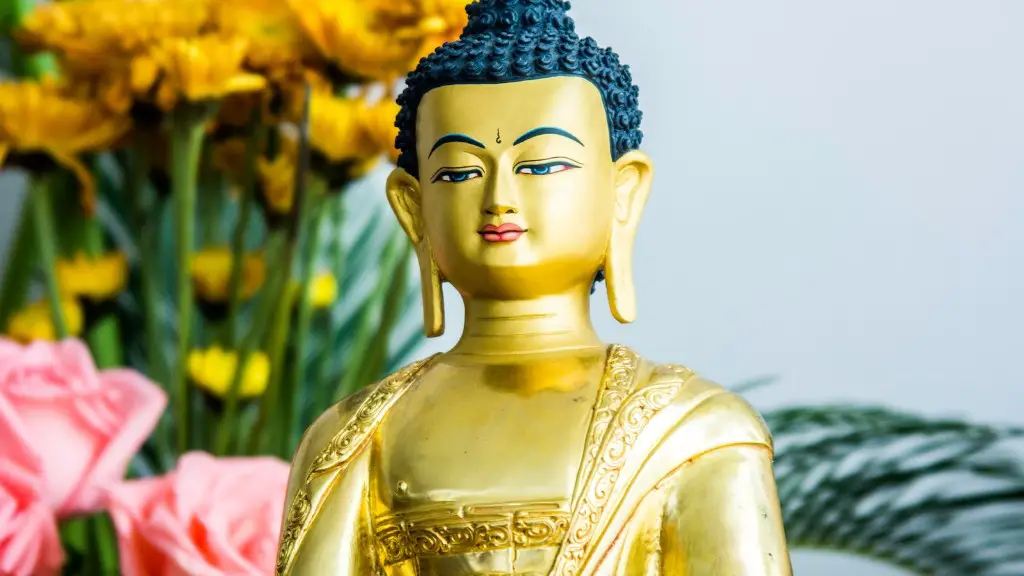Cows are considered to be sacred animals in Hinduism, as is evident from the reverence given to them in the various Vedic scriptures. There are many reasons for this; for instance, cows give the world their milk and dairy products, which are essential sustenance for all humans. In addition, the cow is revered in many Hindu rituals and ceremonies, and they are often seen as serving as a medium between the divine and the earthly realms.
Since ancient times, the cow has symbolized innocence and purity as well as fertility. In the Hindu religion, the cow is a symbol of abundance, as it provides humans with nourishment and sustenance. The cow is seen to represent the mother goddess – mother of the universe and all that exists within her. Hindus believe that treating cows with respect, compassion and kindness is important in order to ensure peace and harmony in the world.
The Vedic scriptures explain that the cow should be protected and preserved, since it provides individuals and the world with many blessings. This means that the cow must be venerated and given proper care to ensure that it thrives and continues to bless the world with its sustenance. For this reason, cows are treated as family members and Hindus often refer to them as ‘Go Mata’ or mother cow.
Not only is the cow revered in Hinduism as a symbol of abundance, but it also represents sustainability. Cows are able to sustain their bodies and our environment due to their ability to consume grass and convert it into nutrients which can be eaten by humans and used as fertilizer for agriculture. They are also known to help maintain the ecological balance by creating healthy soil, which produces vegetation and oxygen.
The cow is also seen as an embodiment of mercy, with the Vedas stating that a person who harms a cow will be sent to the lowest level of hell. The Mahabharata further states that even if an animal has been killed by mistake, it is important to immediately apologize to the cow’s mother and father.
Another reason why cows are seen as sacred in Hinduism is that they are a source of knowledge and enlightenment. Hindus believe the cow is a divine teacher and contains within its form the wisdom of the Vedas and the Upanishads. The cow is therefore seen to embody the spiritual revelations of the divine.
It is clear to see why Hinduism venerates the cow. Not only does the cow provide humans with nourishment, but it also symbolizes abundance, sustainability, mercy and divine knowledge. The cow is an essential part of Hinduism and it is important to respect, care for and protect it.
Duties Towards the Cow
The Vedic scriptures explain that there are certain duties which must be performed in order to honor the cow and demonstrate respect. These include offering of ghee or clarified butter to the cow, as well as providing it with a safe and comfortable shelter. The cow should be treated with gentleness and kindness, and it is seen as a sin to be cruel or unkind to them.
In Hinduism, cows are to be given food and water at least twice per day and should be allowed to graze freely. The cow should also have access to a secluded spot to ensure it’s safety and mental wellbeing. Cows are known to express emotions and feelings, so it is important to treat them with compassion in order to ensure their continued productivity.
Hindus are encouraged to revere and have compassion for all animals, and the cow is no exception. It is important to constantly strive to improve the quality of life for the cow, and for all creatures, as this will help ensure peace and harmony within the world.
Celebrating The Cow In Hinduism
The cow is celebrated within Hinduism in various ways. One of the most common forms of celebration is the festival of Gopashtami, which is celebrated every year in November. During this festival, cows are bathed and decorated with special trinkets and garlands, then taken around the village in a procession with traditional music.
This festival is reminiscent of the ancient practice of herding cows across long distances in order to ensure the safety of their livestock. On the more spiritual side, cows are also venerated during the Kartik month, which is the time when the moon shines brightly on the night of the full moon. During this time, cows are given a special meal and worshipped, in order to show gratitude for their blessings.
In addition, the cow is celebrated within the Hindu religious ceremonies. During puja rituals and offerings, the cow is seen to embody both spiritual and material blessings and is therefore given offerings in the form of fruits, grains and other items. This is an important form of veneration, as Hindus believe that honoring the cows will ensure health and prosperity for all.
The Spiritual Significance Of Cow Milk
One of the most important parts of the cow, in Hinduism, is the milk it produces. It is believed that cow milk has the power to purify and remove karmic sin from individuals, as well as bestow material and spiritual benefits. In parts of India, serving cow milk to guests is a sign of hospitality, and it is believed that sweetness in the milk indicates health, wealth and emotional well-being for the guest.
In many Hindu ceremonies, such as weddings and religious initiation ceremonies, cow milk is used as a purifying agent to cleanse the sacred altar and to signify the spiritual bond between two individuals. Hindus also honor and celebrate the cow by offering it flowers and thoughtfully prepared dishes. This showing of reverence is a way to demonstrate gratitude for the cow’s blessings.
Cow milk is also seen as essential to daily life in Hinduism. It is believed that cow milk used during puja or religious rituals can increase prosperity, attract cosmic energy and guide individuals to the divine. Cow milk is also seen as nourishing for the mind, body and soul and can be used to reduce negative energy from an individual’s space.
In addition, it is also a sign of love and compassion, as giving someone a bowl of cow milk is seen as a way to express gratitude and love for them. All in all, cows are revered for their milk, which many Hindus regard as an essential part of life.
Hinduism and The Modern Era
In modern times, many Hindus are increasingly concerned with protecting the cow, as it is being seen as an endangered species. As a result of this, many initiatives such as cow sanctuaries and charity organizations have sprung up in recent years in order to protect and conserve the cow. This has been done by educating the masses about the importance of the cow and raising awareness of how the animal is essential to maintaining a healthy environment and providing a steady food supply.
In addition, cow shelters have been set up around India to provide the animal with a safe and comfortable refuge, as well as to raise funds for its protection. This is another example of how Hinduism is changing to accommodate the needs of modern society, by protecting the sacred animal which has been so important to the religion for centuries.
Overall, it is clear to see that the cow is a sacred and beloved animal within Hinduism. Not only does it symbolize abundance and sustenance, but it is also seen as an embodiment of mercy, knowledge and spiritual enlightenment. The cow is respected and venerated in Hinduism, and it is up to all of us to ensure its safety and continued wellbeing.

